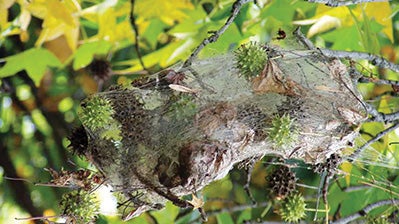Fall webworms can reduce a tree’s quality
Published 1:51 am Saturday, September 22, 2018

- OLYMPUS DIGITAL CAMERA
Looking up into pecan or sweetgum trees, you may notice webs around the tips of branches as well as defoliation under the web. It’s probably and infestation of fall webworms.
In the south, the fall webworm uses many deciduous hardwood trees as its host. Some favorite host trees are hickory, pecan, persimmon and sweetgum.
The adult fall webworm is a medium sized white moth with a wide body. The wings are marked with brownish to black spots. The larvae or caterpillar of the fall webworm has an orange head and small bumps on the body. Full grown fall webworms can reach 1-1/4 inches.
Each year the fall webworm can produce three to four generations. The first generation begins in early spring. The larvae of the last generation pupates in late October and early November.
Fall webworms feed in groups. As the caterpillar becomes larger, they construct large, loose, irregular shaped silk webs. These self-made ‘tents’ serve as protection from predators — mostly birds. As the caterpillars continue to feed and grow larger, they will expand the size of the webbing to encompass more foliage to consume.
The fall webworm does not usually kill trees but an infestation can reduce the quality of the current season’s pecan crop and reduce crop yields for the following season. Many native insects will feed on the eggs of the fall webworm while other insects will become parasites on the young larvae.
If only a few webs are present on your pecan, hickory, persimmon or sweetgum tree, it’s best to prune out the webbing and discard it in the trash. If a homeowner chooses a chemical approach there are several insecticides that offer great control.
The liquid formulas of Sevin or Carbaryl will control fall webworms. If you prefer an organic approach then Bacillus thuringiensis (Bt) is an excellent option.
Rebecca Bates is an MSU Extension-Lincoln County agent, and can be reached at 601-835-3460 or by e-mail at rebecca.bates@msstate.edu.





